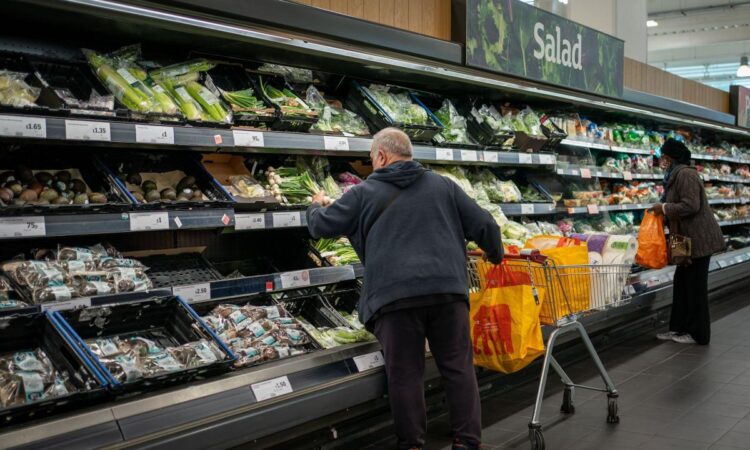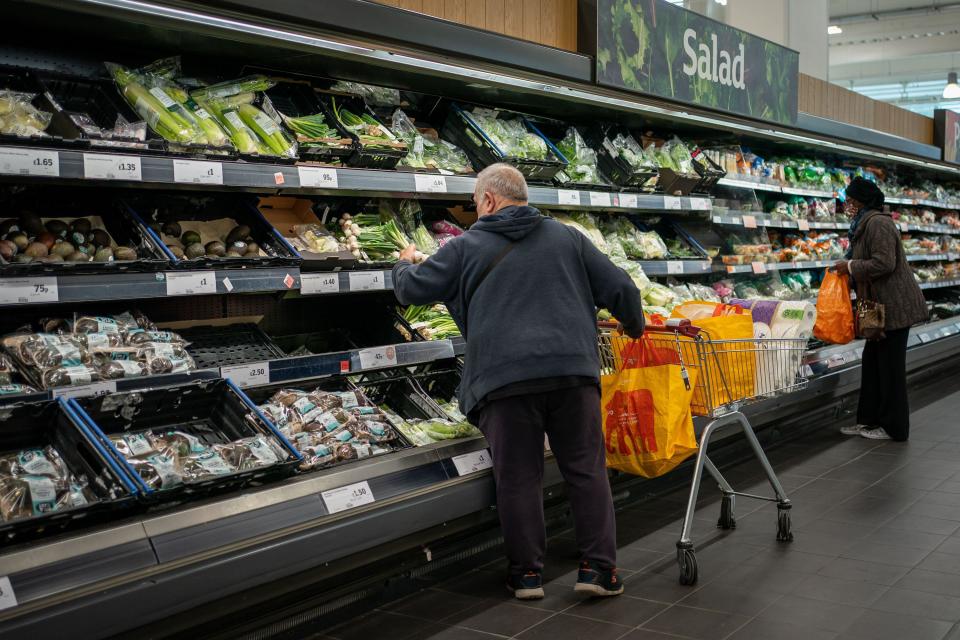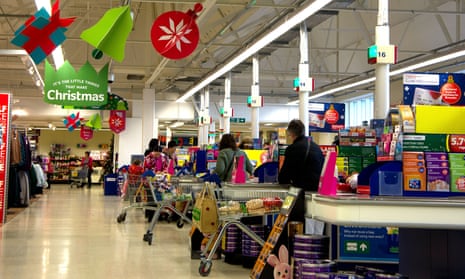

European stock markets were fairly muted on Tuesday, continuing their lacklustre start to the week, as new data revealed that UK annual grocery inflation has fallen.
In London, the FTSE 100 (^FTSE) was trading 0.4% lower after opening, while the CAC (^FCHI) gained 0.2% in Paris, and the Frankfurt DAX (^GDAXI) was more than 0.1% up.
British grocery inflation came in at 9.1% in the four weeks to 26 November, down from 9.7% a month earlier, according to Kantar.
Kantar also predicted that supermarket sales will surpass £13bn for the first time ever this December, with 22 December set to be the busiest day for festive grocery shopping.
“The scene is set for record-breaking spend through the supermarket tills this Christmas,” Fraser McKevitt, head of retail and consumer insight at Kantar, said.
“The festive period is always a bumper one for the grocers, with consumers buying on average 10% more items than in a typical month. Some of the increase, of course, will also be driven by the ongoing price inflation we’ve seen this year.”
Read more: How first-time buyers can get on the property ladder in a cost of living crisis
Meanwhile stocks are also being weighed down by a rebound in the US dollar as well as weakness in basic resources and energy prices, while investors take a pause after the gains of the past couple of weeks.
“US markets fared little better, sliding back in the face of a modest rebound in yields as investors hit the pause button ahead of this week’s jobs data, which is due at the end of the week,” Michael Hewson, chief market analyst at CMC Markets, said.
He added: “There is certainly an element of the market getting ahead of itself when you look at a US economy that grew at 5.1% in Q3 and still has an unemployment rate of 3.9%.
The same sadly cannot be said for Europe where the French and German economies could well already be in recession.”
Across the pond, the S&P 500 (^GSPC) fell 0.5% on the day on Monday, and the tech-heavy Nasdaq (^IXIC) was 0.8% lower. The Dow Jones (^DJI) slipped 0.1%.
-
Moody’s cuts China’s credit outlook to negative
Moody’s has cut its outlook for China’s government bonds from stable to negative amid concerns about rising debts and its slowing economy.
The credit rating agency said Beijing’s government will need to provide support to “financially-stressed regional and local governments and State-Owned Enterprises”.
This would pose broad downside risks to China’s fiscal, economic and institutional strength.
It said:
Moody’s expects that China’s annual GDP growth will be 4.0% in 2024 and 2025, and average 3.8% from 2026 to 2030, with structural factors including weaker demographics driving a decline in potential growth to around 3.5% by 2030.
-
Gold prices on the rise
Gold prices (GC=F) are also in focus today after yesterday’s new record high of $2,135.39 saw a sharp reversal with prices closing lower in what looks like a bull trap.
Gold is trading 0.4% higher at $2050.70 as bond yields continue to decline from October peaks.
“I think gold is in the early days of a bull market breaking out to new highs,” Mike McGlone, Bloomberg Intelligence senior macro strategist, told Yahoo Finance.
The precious metal is seen as a safe-haven asset during times of uncertainty. Its rise in price comes amid declining 10-year Treasury yields as the market anticipates the Federal Reserve will lower interest rates next year. Lower longer-term yields typically prompt investors to ditch bonds in favour of the precious metal.
Central banks have been among the biggest gold buyers in the last couple of years, with a record-breaking first half of 2023.
Global official gold reserves are 120% higher quarter over quarter and boast the second-highest third quarter total since the industry group World Gold Council started publishing the quarterly metric.
China is the largest buyer, followed by Poland and Singapore.
-
Brits delay Christmas spending

A Tesco store at christmas UK consumers are delaying their Christmas shopping as retail spending figures for November were weak despite Black Friday sales.
According to the British Retail Consortium and KPMG, total UK retail sales increased by just 2.7% in November, down on last year’s 4.2% uplift.
Food and drink, health, personal care and beauty products continued to drive growth, while jewellery and watches saw the biggest decline in sales on the high street.
BRC chief executive Helen Dickinson said:
Black Friday began earlier this year as many retailers tried to give sales a much-needed boost in November.
While this had the desired effect initially, the momentum failed to hold throughout the month, as many households held back on Christmas spending.
Retailers are banking on a last-minute flurry of festive frivolity in December and will continue working hard to deliver an affordable Christmas for customers so everyone can enjoy some Christmas cheer.
-
Asia and US stocks
Asian stocks slipped overnight as investors awaited on US jobs data and digested a interest rate hold from the Australian central bank.
The Nikkei (^N225) slumped 1.4% on the day in Japan, while the Hang Seng (^HSI) finished 1.9% lower in Hong Kong, hitting a one-year low.
The Hang Seng is down more than 17% for the year so far, while world stocks are up almost 15% by contrast.
The Shanghai Composite (000001.SS) was 1.7% down by the end of the session.
The Australian dollar fell 0.6% after the central bank left interest rates on hold on hold at 4.35%as expected.
On Wall Street, the S&P 500 (^GSPC) fell 0.5% on the day to 4,569.78, and the tech-heavy Nasdaq (^IXIC) was 0.8% lower to 14,185.49. The Dow Jones (^DJI) slipped 0.1% to 36,204.44.
The yield on the 10-year Treasury bonds, rose to 4.25% from 4.21% on Friday.
-
Coming up…
Good morning, and welcome back to our markets live blog. Stay tuned to keep up-to-date with all that’s happening across the global economy, and with what’s moving markets.
Here’s a quick look at the agenda for today:
12:01am: UK retail sales
7am: Trading announcements: Moonpig, Ashtead Group, Marstons
7.45am: French industrial production report for October
9am: UK car registrations data for November (SMMT)
9am: Eurozone service sector PMI report for November
9.30am: UK service sector PMI report for November
12pm: Brazil’s Q3 GDP report
3pm: US service sector PMI report for November
3pm: TIPP survey of US economic confidence
3pm: JOLTS survey of US job openings
Watch: How does inflation affect interest rates?
Download the Yahoo Finance app, available for Apple and Android.






